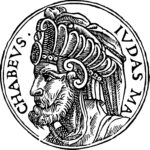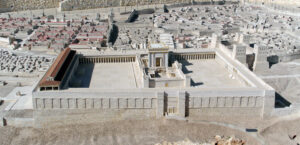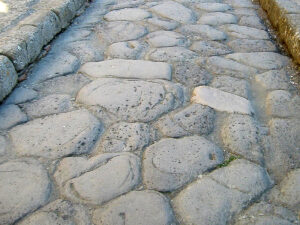By Dr. Don Bierle, FaithSearch President
Upon reading the heading above, some might wonder if that might be the name of a rock band, the latest religion, or even a new fast food sandwich! Some may be aware the Maccabees were a Jewish priestly family who, by the hand of God, helped to prepare the way for the incarnation of Jesus, the Son of God, to planet earth.
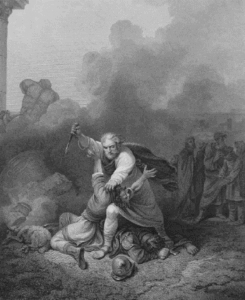
(Public domain.)
A Brief History
The Palestinian region experienced turmoil for nearly two hundred years after the death of Alexander the Great in 323 BC. Two of Alexander’s generals, Seleucus and Ptolemy, had established the Seleucid (Turkey, Syria, and Judea) and Ptolemaic (Egypt) empires, respectively. They fought repeatedly over the Palestinian region with the result that Jerusalem changed hands many times. In 200 BC the Seleucid’s gained the upper hand.
About that time the Jews in Jerusalem had their own “war” going on between the pro-Hellenistic sympathizers (who accepted Greek/Roman culture) led by high priest Menelaus; and the pro-Orthodox (who opposed Hellenism) led by high priest Jason. When Jason and his followers drove out the Hellenists, it provoked Seleucid king Antiochus IV (pro-Hellenistic). He attacked and captured Jerusalem in 167 BC, reinstating high priest Menelaus. He also introduced laws to accelerate Hellenism among the Jews; set up an altar of sacrifice to Zeus on the Temple Mount; and desecrated the Temple altar by covering it with the ceremonially unclean blood of swine.
Enter the Maccabees
King Antiochus’ actions incensed the devout priest Mattathias from the village of Modi’in. He led an insurrection with his five sons, including Judas Maccabee, from whom the movement derives its name. Against all odds, they defeated the Seleucids, and when Antiochus IV died in 164 BC, it was as a sign from God to them. The Maccabees moved quickly and forcefully to oust the Hellenistic leaders from Jerusalem. They purged and rededicated the Temple – an event celebrated yet today as the Feast of Lights or Hannukah.
By 142 BC, the Maccabees had established the Hasmonean dynasty which lasted until 63 BC. It took another twenty years of skirmishes against the Seleucid government and their pro-Hellenistic followers in Judea to establish one of the few times of complete independence for the Jews. Archaeology reveals that by 110 BC, their Hasmonean Kingdom occupied all the territory from the Jordan River to the Sea and from lower Galilee to the Negev.
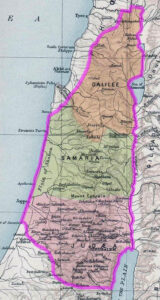
To accomplish this task, they sought allies – both Egyptian and the Roman Republic. While the allies did not assist militarily, archaeology has discovered many coins minted in Palestine by them from the 160s through the 140s to help finance the Maccabean war effort.
While the finances assisted their victory, the alliances also became their “undoing.” In 63 BC, the Romans captured the region and in 37 BC, Herod the Great was appointed king of Israel by the Roman senate. While this ended the Hasmonean dynasty, they had made a major contribution to the preparation of Israel for their Messiah.
In the Fullness of Time
The apostle Paul wrote in the letter to the Galatians, “But when the fullness of the time came, God sent forth His Son…” (4:4). Author James Stewart stated it this way: “Search the pages of history up and down, and in all the tale of the centuries you will not find any generation in which Christ could better have come than just the generation in which He did come.” Why would he say that?
- Leading up to Christ’s birth as many as three million Jews were scattered throughout the ancient world, with only one million in Palestine. Wherever they went, they established synagogues. These became a prepared place, and their Gentile converts a prepared bridge for preaching the Good News of Jesus.
- The Greeks, too, made the first century the ideal time for the incarnation. The world was essentially a giant, united society because of its shared culture and Greek language. At no other time in world history would cross-cultural missions be virtually unnecessary.
- Likewise, the Romans united the world politically. Jesus’ disciples could proclaim the Gospel via the 53,000 miles of Roman roads and be protected by a uniform-and-mostly-just Roman law. It was a rare time when most of the world would be at such peace. Though the country was a vassal under Roman rule, the appointment of a king who was raised a Jew, Herod the Great, helped him to understand their faith and to provide for freedom of worship. His many building projects – for example, the Temple in Jerusalem – was an important feature in the ministry of Jesus.
- Finally, the Maccabees restored Orthodox Judaism and the sanctity of the Temple in Jerusalem – just in time for Jesus’ ministry there.
Jesus’ coming was neither a moment too early, nor a moment too late.
Source material: Biblical Archaeology Review, Summer 2023, pp. 32-39; 1 Maccabees.

